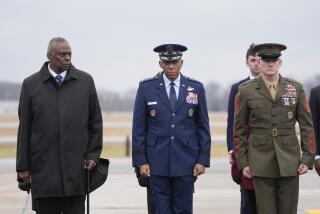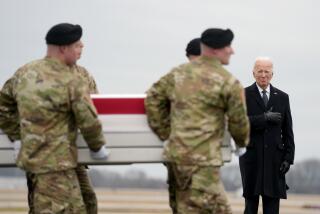Rebels in Western Iraq Under Siege
- Share via
RIBAT, Iraq — The casualties mounted Monday in remote Iraqi desert villages near the Syrian border after U.S. troops launched their largest offensive since last year’s invasion of Fallouja.
Insurgents have killed at least three Marines and wounded 20 American troops trying to cross the Euphrates River in western Iraq since the offensive began Sunday. Marine commanders estimate they have slain more than 100 guerrillas.
From a hilltop overlooking Ribat, a Times reporter traveling with members of the 2nd Marine Division could see insurgents driving to houses on the northern edge of the town, filling trucks with AK-47s and rocket-propelled-grenade launchers and ferrying them to the south side of the village where the battle was taking place.
Children stood near one of the houses. A woman casually hung clothes on a line. Marines held their fire.
On Monday, more than 1,000 Marines, sailors and soldiers from Regimental Combat Team 2 crossed to the north side of the Euphrates River. The U.S. troops were preparing for a large-scale assault today in the region’s scattered villages.
Marines hope the assault will flush out insurgent fighters who the Marines believe have made the Ramana region -- a conglomeration of well-irrigated riverside towns -- a haven and training ground for foreign guerrillas. The 2nd Marine Division is responsible for security in Al Anbar province, a desert region the size of South Carolina that runs from Jordan in the south to Syria in the north.
“The insurgents we’re fighting today are not the guys getting $50 to put [a roadside bomb] on the side of the road,” regiment commander Col. Stephen Davis said. “These are the professional fighters who have come from all over the Middle East. These are people who have received training and are very well-armed.”
The Marines say that capturing or killing insurgents in these villages is key to pacifying Iraq. Recruits from western Iraq and much of the nation’s Sunni Muslim heartland fuel the insurgency.
Foreign fighters pour across the border here to volunteer as suicide bombers, the guerrillas’ most potent weapons, which in the last month have claimed scores of Iraqi lives. Abu Musab Zarqawi, the Jordanian-born militant who leads an Al Qaeda group in Iraq, is said to travel this region with impunity, granted the protection of powerful Sunni clans resisting U.S. forces and their Iraqi allies.
The U.S. operation had been delayed a day because of insurgent attacks from at least two nearby cities.
Guerrillas appeared well-prepared, with sandbag bunkers piled in front of some homes, and fighters strategically positioned on rooftops and balconies. In the predawn hours Sunday, occupants of houses along the road to Ubaydi flashed their lights one after the other, apparently to signal that the U.S. military was on the way.
In nearby New Ubaydi and Karabilah, insurgents fired mortar rounds at Marine convoys along the river’s southern edge. Marines who pursued attackers in those towns took part in house-to-house combat against dozens of well-armed insurgents.
One Marine was walking into a house when an insurgent hiding in the basement fired through a floor grate, killing him. Another Marine, who was retrieving a wounded comrade inside a house, suffered shrapnel wounds when an insurgent threw a grenade through a window.
Machine-gun fire lighted dozens of windows and doorways like strobes. Three Cobra helicopters pummeled insurgent positions for several hours, raining machine-gun fire and Hellfire missiles on houses believed to hold weapons caches.
A U.S. helicopter sent up a row of water columns as it fired on boats used by insurgents to transport weapons from one side of the river to the other. An F/A-18 Hornet screeched overhead and dropped a laser-guided bomb on a truck used by insurgents, gutting the vehicle and a nearby house.
As U.S. troops inflicted casualties on the guerrillas, they had to care for their own wounded. One Marine suffered a broken back and at least two others were wounded Sunday when a land mine damaged their tank.
“Sunday was tough for us,” said a Marine officer, who asked that his name not be used.
Marines said some insurgents in Sunday’s battle wore body armor. There was a furious volley of gunfire after insurgents cut the lights in Ribat for a few moments, suggesting that some of them had night-vision equipment.
Mortar attacks on the Marines’ positions were unusually accurate, Davis said. Insurgents had also prepared for the U.S. assault by planting car bombs along the route.
Marines had planned to push the insurgents from the eastern and southern parts of Ramana into mountains along the Syrian border. A platoon of Marines was deployed to those jagged slopes to block escape routes, but no guerrillas fled there on the first day of sustained fighting.
“They were clearly holding their ground,” Davis said. “This continues to be a problem area. They’ve got seasoned fighters out here -- this is a dedicated enemy that needs to be rooted out. That could take days, or weeks or months. We’ll stay here until it’s done.”
Some Marines complained there were too few U.S. troops to cover an area with so many trouble spots. To stage the assault, Marine bases across the region had to contribute assets and personnel.
Many of the Marines participating in the attack are from a battalion based at the Haditha Dam, where insurgents’ mortar attacks are a daily occurrence. Three Marines and a sailor were killed Sunday in attacks in Haditha, a rebel stronghold about 80 miles east of the fighting. Guerrillas in Haditha occupied a hospital and set up positions inside the facility as a car bomb plowed into Marine positions, the military said.
Although Iraqi security forces have taken on stronger roles in eastern and northern Iraq -- in cities like Mosul, Irbil and Baghdad -- they have virtually no presence in western Iraq. The lack of Iraqi forces fighting alongside U.S. troops has long hindered the battle against insurgents in Al Anbar province.
Recruitment in Sunni areas has been a major problem because many Sunnis view the Iraqi security forces as U.S. collaborators. The price for collaboration here is death. Many local forces have deserted or joined the guerrillas.
“We require more manpower to cover this area the way we need to,” said one military official, who requested anonymity.
The Marines have three battalions in Al Anbar, one fewer than six months ago -- and each of those battalions is missing a company, say military commanders. A battalion consists of about 1,000 Marines and a company generally has about 150 troops.
“But for another battalion or two, we would have crossed that river Sunday,” the military official said.
Although politicians in Baghdad aim to coax Sunnis into the political fold, here in Iraq’s “wild, wild West,” as the region is known, the military option is still paramount. The assault on Ramana is clearly a case in which U.S. forces are going it alone.
Iraqi forces, though growing in capability, are still not ready to mount offensives like the complex operation being launched here. U.S. forces often must transfer troops from one trouble spot to another, movements that insurgents monitor closely. Insurgents often leave areas as U.S. forces move in and filter back once troops withdraw.
The vastness of the region here means U.S. forces cannot maintain a presence in every village, town and city where the insurgents operate.
Residents who might sympathize with the new Iraqi government often choose not to turn in insurgents because they know the U.S. presence in these villages is temporary.
More to Read
Sign up for Essential California
The most important California stories and recommendations in your inbox every morning.
You may occasionally receive promotional content from the Los Angeles Times.












